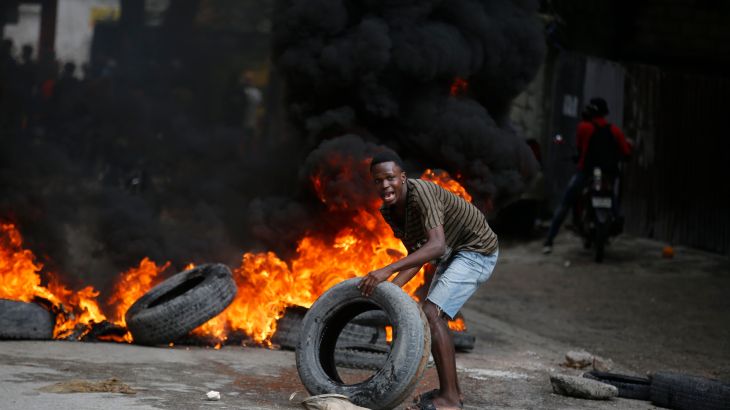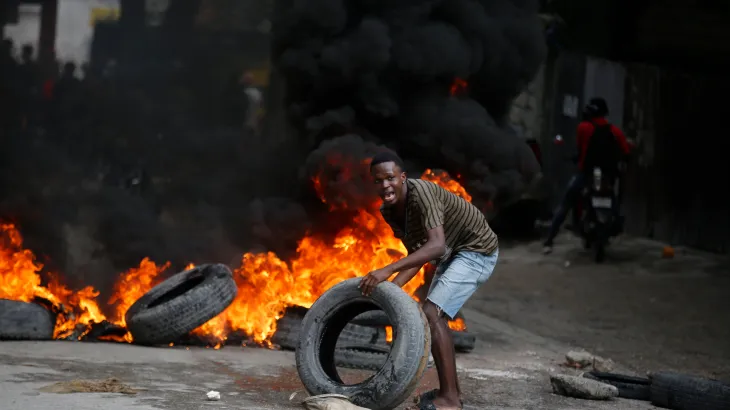Haiti Crisis: Is a Gang-led Coup Next?
LATIN AMERICA AND THE CARIBBEAN, 11 Mar 2024
Al Jazeera News - TRANSCEND Media Service
5 Mar 2024 – Haiti is in chaos after a massive prison break and gangs calling for the resignation of its prime minister. How did it get here?

Haiti’s government declared a 72-hour state of emergency on Sunday after armed gang members stormed the Caribbean nation’s two biggest prisons, freeing more than 4,700 inmates.
In capital Port-au-Prince, corpses lie in neighbourhoods and burning tyres serve as roadblocks.
Meanwhile, the whereabouts of Prime Minister Ariel Henry are unknown, after he visited Kenya last week. Finance Minister Patrick Boivert, as acting prime minister, announced the curfew.
How did Haiti get to this point?
At least 12 people have been reported dead, four of them being police officers.
Gangs have targeted police stations including the national penitentiary, the Toussaint Louverture International Airport, and even the national soccer stadium. A second prison in Port-au-Prince containing around 1,400 inmates was also overrun.
Yet the violence has roots in turbulent political history that has shaped — and continues to shape — Haiti.
1959: A failed coup by military officials and foreigners to overthrow President Francois “Papa Doc” Duvalier, led him to create his secret police force, the Tonton Macoutes, to serve as a counterweight to the army.
1990s: Former parish priest Jean-Bertrand Aristide, a left-wing champion of the poor, won Haiti’s first free election in 1990. He was removed in a coup in 1991 to be replaced by Rene Preval.
2000: In the early 2000s, Aristide formed his own armed gangs known as the Chimeres, serving as a protection racket and an instrument of political opposition. In 2001, Aristide was sworn in as president again.
2004: A prominent gang, known as the Cannibal Army at the time, also called the Artibonite Resistance Front, seized control of Gonaives, a commune in northern Haiti on February 5. Later that month, they took control of the country’s second-biggest city, Cap-Haitien. As the gang attacked Port-au-Prince, Aristide resigned, amid allegations of French and US support for the coup plotters because of Aristide’s call for reparations — claims that Paris and Washington have denied.
2010: A catastrophic earthquake killed between 100,000 and 300,000 people, according to various estimates. The earthquake also led to former gang members escaping prison and taking over makeshift camps, originally made for earthquake victims. Gender-based violence perpetrated by gangs also began to rise.
2011-14: Michel Martelly won the presidential elections. But amid mounting anger over corruption and poverty, large anti-government protests broke out against his government.
2017: Banana exporter-turned-politician Jovenel Moise was declared the winner of the 2016 presidential election.
2018: Members of the Moise government allegedly helped gangs commit massacres by providing them with money, weapons and government vehicles used in attacks on the capital.
2019: Due to a political gridlock and unrest, Haiti failed to hold new elections, leading to Moise steadily amassing power.
2021: Thousands protested on the streets calling for Moise’s resignation, chanting “No to dictatorship”. Moise was assassinated in July by Colombian mercenaries with unknown paymasters. Ariel Henry was sworn in as prime minister with the help of international backing after Moise’s assassination.
How much power do gangs have in Haiti?
Gangs hold considerable influence in Haiti. Until recently, they controlled around 60 percent of the capital, and United Nations (UN) officials say that number has grown to 80 percent. Around 200 gangs exist in Haiti, and 23 dominant ones are believed to be operating in the metropolitan capital.
Firearms – typically smuggled from the United States, alongside ransom payments to kidnappers – have lent financial independence to gangs. An underfunded and under-resourced police department has also allowed the gangs to amass power that the state has struggled to match.
“Present-day gangs enjoy a much higher degree of military capacity than those a decade ago,” according to a report by the Global Initiative against Transnational Organized Crime, a non-governmental organisation headquartered in Geneva. “This has largely been driven by the gangs’ ability to acquire high-caliber weapons.”
A 2023 UN report stated that recovered weapons destined for Haitian ports include “.50 caliber sniper rifles, .308 rifles, and even belt-fed machine guns”.
Since the recent outbreak of violence, around 15,000 people have fled the capital, as estimated by the International Organization for Migration. Many of the people who escaped were already previously displaced and in makeshift camps in schools, hospitals and public squares.
In 2023 alone, around 200,000 residents fled the kidnappings, looting and sexual violence related to gangs. Around 3,000 people were killed as a result of gang violence and 1,500 were kidnapped for ransom.
Why did the violence escalate?
Analysts believe the escalating violence is aimed at ousting Henry — it has coincided with the prime minister’s visit to Kenya, where he has pushed for the UN-backed deployment of an international force to help fight the gangs.
Henry had repeatedly requested for international intervention in Haiti and in July 2023, Kenya stepped up and volunteered to lead an international force to combat the gang violence. Kenya promised to “deploy a contingent of 1,000 police officers to help train and assist Haitian police”.
In January, a Kenyan court blocked the deployment of that force, but during his visit to Nairobi, Henry inked a pact with Kenyan President William Ruto for a reciprocal deal that they suggested could allow the East African nation to send soldiers to Haiti.
Separately, on October 2, 2023, the UN adopted a resolution authorising the creation and year-long deployment of a “Multinational Security Support” (MSS) mission to reinforce the Haitian police, restore security and protect critical infrastructure. The Bahamas, Bangladesh, Barbados, Benin and Chad formally pledged troops to this force, and less than $11m was deposited in its fund.
However, a date for when the troops will be deployed is still not set.
Could gangs overthrow the government?
Gangs already act as de facto authorities in parts of the country.
Gang leaders — Jimmy “Barbecue” Cherizier is the most prominent among them — want to bring down Henry. The country has failed to hold parliamentary and general elections since 2019 and there are no elected officials. The latest round of attacks also came amid Henry’s pledge to hold long-awaited general elections by mid-2025.
Cherizier is a former elite police officer, now considered one of Haiti’s most powerful gang leaders. He announced that he would try and capture the country’s police chief and government ministers.
Last summer, Cherizier urged Haitians to mobilise against the government, adding that he would fight any international armed force if they committed abuses.
Cherizer leads a gang federation known as G9 Family and Allies, and he has previously launched powerful attacks that have crippled the country. In late 2022, he seized control of an area surrounding a key fuel terminal in the capital of Port-au-Prince for almost two months.
How is the world reacting?
The US Embassy in Haiti released a statement on Sunday, urging US citizens in Haiti to depart from the country “as soon as possible”. The embassy also said that it will operate at limited capacity starting Monday and all visa appointments from Monday to Wednesday have been cancelled.
The neighbouring Bahamas said it had called most of its embassy staff back, leaving just its charge d’affaires and two security attaches, while Mexico said its nationals should limit themselves to essential transit and stock up on water, fuel and nonperishables.
Haiti shares the island of Hispaniola with the Dominican Republic, which last year deported tens of thousands of Haitians. The Dominican Republic announced on Monday that its defence minister was touring the border to supervise progress on a border fence, while the president ruled out opening refugee camps for Haitians in the country.
The security situation in Haiti has caused aid groups to pause their work in the country, according to the International Rescue Committee, which works with the groups.
Tags: Central America, Culture of Violence, Haiti, Latin America Caribbean, USA, United Nations
DISCLAIMER: The statements, views and opinions expressed in pieces republished here are solely those of the authors and do not necessarily represent those of TMS. In accordance with title 17 U.S.C. section 107, this material is distributed without profit to those who have expressed a prior interest in receiving the included information for research and educational purposes. TMS has no affiliation whatsoever with the originator of this article nor is TMS endorsed or sponsored by the originator. “GO TO ORIGINAL” links are provided as a convenience to our readers and allow for verification of authenticity. However, as originating pages are often updated by their originating host sites, the versions posted may not match the versions our readers view when clicking the “GO TO ORIGINAL” links. This site contains copyrighted material the use of which has not always been specifically authorized by the copyright owner. We are making such material available in our efforts to advance understanding of environmental, political, human rights, economic, democracy, scientific, and social justice issues, etc. We believe this constitutes a ‘fair use’ of any such copyrighted material as provided for in section 107 of the US Copyright Law. In accordance with Title 17 U.S.C. Section 107, the material on this site is distributed without profit to those who have expressed a prior interest in receiving the included information for research and educational purposes. For more information go to: http://www.law.cornell.edu/uscode/17/107.shtml. If you wish to use copyrighted material from this site for purposes of your own that go beyond ‘fair use’, you must obtain permission from the copyright owner.
One Response to “Haiti Crisis: Is a Gang-led Coup Next?”
Read more
Click here to go to the current weekly digest or pick another article:
LATIN AMERICA AND THE CARIBBEAN:

How sad and sickening. Haiti is such a beautiful country and talking of Port au Prince, Graham Greene and the Hôtel Oloffson, we have so many fond memories of Haiti. Haiti may be a shocking place to live now but not everyone thinks Haiti is Hell and that sentiment would not just be limited to Graham Greene were he alive. Of course, Graham was one of the great writers of the 20th Century and an MI6 spook.
One other ex-spook used to love Haiti until the TonTon Macoute hunted him down like a wild animal. Maybe he deserved it? Was he front running the real CIA Haitian equivalent to the Cuban Bay of Pigs?
If you relish and yearn for Haitian spy thrillers as curiously and bizarrely compelling as Graham Greene’s Comedians, crave for the cruel stability of the Duvaliers and have frequented Hôtel Oloffson you’re never going to put down Bill Fairclough’s fact based spy thriller Beyond Enkription in The Burlington Files series. His Haitian experiences may have been gruesome but they make for intriguing reading compared with today’s grim news.
Beyond Enkription is an intriguing unadulterated factual thriller and a super read as long as you don’t expect John le Carré’s delicate diction, sophisticated syntax and placid plots. Nevertheless, it has been heralded by one US critic as “being up there with My Silent War by Kim Philby and No Other Choice by George Blake”. Little wonder Beyond Enkription is mandatory reading on some countries’ intelligence induction programs.
Beyond Enkription is so real you may have nightmares of being back in Port au Prince anguishing over being a spy on the run. The trouble is, if you were a spook being chased by the TonTon Macoute in the seventies you were usually cornered and … well best leave it to your imagination or simply read Beyond Enkription. It’s considered compulsory reading for espionage aficionados.
Interestingly Fairclough was one of Pemberton’s People in MI6 (see a brief intriguing News Article dated 31 October 2022 in TheBurlingtonFiles website). If you have any questions about Ungentlemanly Warfare after reading that do remember the best quote from The Burlington Files to date is “Don’t ask me, I’m British”.